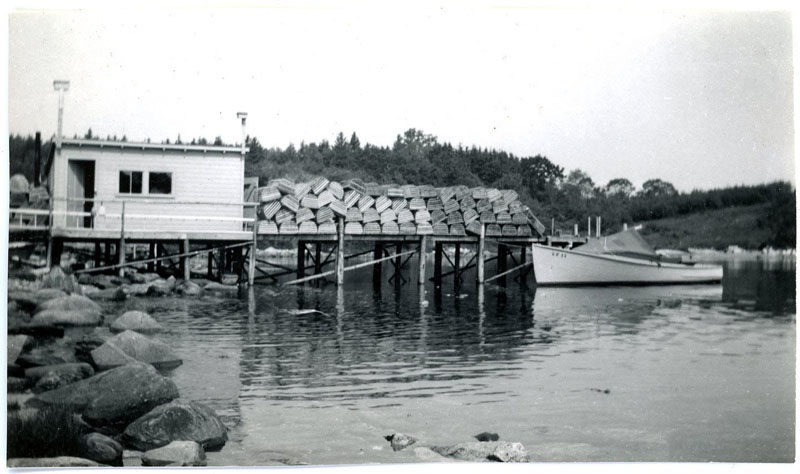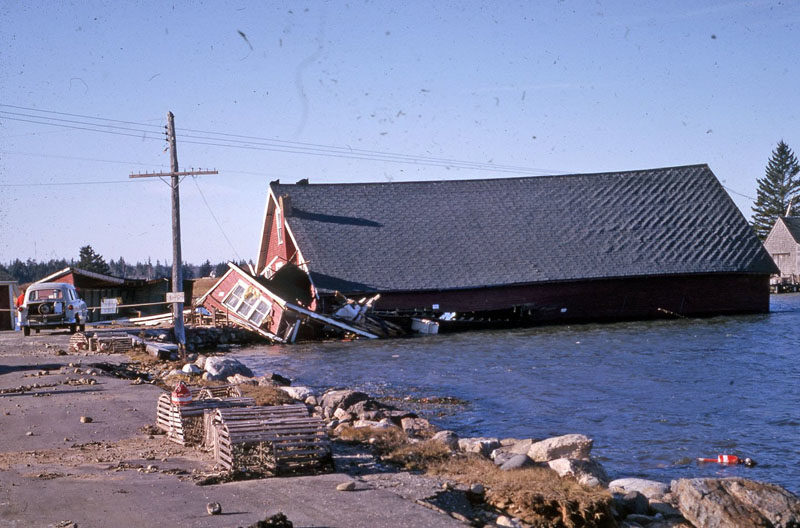
Local history is preserved in the Old Bristol Historical Society archives. The January 2024 storms destroyed Don Osier’s New Harbor dock, but here it is circa 1955 when it was used by Osiers grandfather, Elmer. Note the wooden lobster traps. (Photo courtesy Old Bristol Historical Society, Donald Osier Collection)
Mainers have always had a strong interest and pride in the history of their state and their own towns.
Maine separated from Massachusetts in 1820, and just two years later established its own state historical society. What is remarkable about this is that only two other states in the country had established historical societies at that time: the Massachusetts Historical Society, established in 1791, and the New York Historical Society, established in 1804.
Apparently, Mainers were very keen to establish their own identity and history apart from Massachusetts.
The Old Bristol Historical Society was founded in 2003, but many people in the past have worked hard to preserve Bristol’s history. In the late 1800s, interest focused primarily on recovering and celebrating the history of Colonial Pemaquid. At that time, a campaign was undertaken to raise money to build a memorial on the former site of Fort William Henry.
After a number of years, that effort succeeded with help from the state and the reconstructed fort tower and outline was dedicated in 1909. At one time plans for that memorial included the establishment of an archive inside the tower where Bristol’s historical documents and primary sources could be kept.
That archive never materialized, but 125 years after the fort’s dedication the Old Bristol Historical Society has successfully established Bristol’s first, professionally managed historical archive housed in a secure, climate-controlled vault.
In 2014, professional archivist Chuck Rand began caring for items in the historical society’s collection, storing many of them in his own house, which provided a more protective environment than the unheated McKinley School, which was then the society’s headquarters.
In 2019, the society began fundraising to build a more suitable storage space at the schoolhouse, but with the acquisition of the former Poole Bros. lumber store in 2020, the perfect space became available to build a secure concrete vault.
By the spring of 2023, the society had raised a little more than $68,000, including $19,000 generously appropriated by the town via two votes at town meeting, and completed construction of a 163 square foot climate-controlled vault, equipped with compact shelving that provides 356 linear feet of storage.

The Old Bristol Historical Society archives show powerful storms have long been part of the area’s history. Here is the Lewis Pavilion at Pemaquid Beach destroyed by a storm in December 1963. (Photo courtesy Old Bristol Historical Society, Norman R. Brackett Collection.)
Although Rand stepped down in December, the historical society has remained committed to providing professional management of its archive.
To that end, the society recently created a paid part-time collections manager position and hired professional archivist Alison Brislin to fill the role.
Some may ask, “Why is a professional archivist needed if materials are safely stored in a vault?” The answer is that just as a librarian is needed to turn a building full of boxes of books into a library, an archivist is needed to turn a vault full of papers, documents, diaries, records, photographs, etc. into an archive.
An archivist creates gift agreements and accession records, inventories donated collections, creates finding aids for what is stored in boxes, catalogues items, and organizes shelves, all so provenance can be recorded and others can access the materials stored in the archive.
With both a vault and an archivist now in place, the society is well-equipped to develop the sort of historical archive Bristol has long deserved.
During a recent strategic planning session, the society’s board of directors identified one of its main goals as follows: “Grow our collections to the point where we are the first and most significant place to research Bristol history.”
Even though the archive is young, the historical society already has a good start on collecting primary sources for preservation. The scope of the society’s collection can be viewed via the online catalogue accessible through the Old Bristol Historical Society website.
The society’s directors continue to be concerned historically significant materials such as family photographs, postcards, diaries, business records, documents, personal papers, as well as stories about ancestors that have been passed down through the generations, are continuously being lost, forgotten, dispersed among multiple family members, moved out of town, or even being thrown away as houses change hands.
Once such things are gone, they are gone for good. It is the historical society’s mission to collect and preserve these types of materials.
To be a part of growing this important archive for the future, the board of directors encourages Bristol families to think about donating their family histories and other historically significant items to the Old Bristol Historical Society for safe-keeping.
The society’s mission includes not only sharing Bristol’s history with those alive today, but also preserving the town’s primary sources so future descendants and Bristol residents can understand how their town evolved, how the local economy developed, and how their ancestors lived, worked and played.
For more information, email the historical society at oldbristolhistoricalsociety03@gmail.com.



